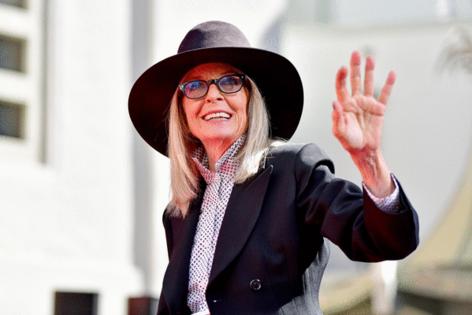Commentary: Diane Keaton is proof that Hollywood needs rom-coms again
Published in Entertainment News
The death of Diane Keaton last week prompted a groundswell of online affection — the kind of shared grief and celebration that can only come with the passing of a true icon. But it wasn’t just a matter of saluting her style or lauding her talent, though those elements were certainly present. Her passing felt personal to many, because she seemed less like a distant star and more like someone people actually knew.
And why is that? There are plenty of possible explanations, but I lean toward the simplest one: because some of her most beloved roles were in romantic comedies, a genre that lives and dies by the empathy and rooting interest we feel for its leads. Yet Hollywood studios have largely stepped away from releasing them theatrically.
So when people ask who the next Diane Keaton might be, it’s hard to know — because the romantic comedy has become somewhat of an endangered species. As audiences revisit her films and share their favorite characters, her death underscores how studios have abandoned a genre that once defined moviegoing for millions of viewers.
You can still find rom-coms, of course. Netflix has picked up the baton and run with it with one-off buzz hits such as "Set It Up," "Your Place or Mine" and "Always Be My Maybe" and franchises such as "The Kissing Booth" and "To All the Boys" films. Amazon.com has followed its lead, producing made-for-Prime titles such as "You’re Cordially Invited" and "Shotgun Wedding." And while streamers tend to prefer series to movies, it’s easy to imagine that "Nobody Wants This" or "The Summer I Turned Pretty" not only could have been, but likely would have been, stand-alone theatrical releases 20 or 30 years ago
The films and shows on subscription platforms are popular, to be sure. But none of them have had the kind of cultural impact and ubiquity as the movies from the golden age of the rom-com, and that strain began with Keaton. Part of the reason is that collective impact is harder to replicate today as audiences are scattered across countless platforms. That’s why theatrical releases are important. They can help bridge the gap by creating the kind of common reference points that turn movies into memories — not just for one person, but for an entire generation.
Moviegoing is why you can draw a direct line from "Annie Hall" to "When Harry Met Sally," "Sleepless in Seattle," "The Wedding Singer," "While You Were Sleeping" or "My Best Friend’s Wedding" — and a direct line from Annie Hall herself, the delightful rom-com protagonist, to those played by Meg Ryan, Drew Barrymore, Sandra Bullock and Julia Roberts.
Looking at the numbers, it’s clear that traditional studios had plenty of incentive to keep releasing rom-coms in theaters. They were typically a smart investment, boasting not only enormous returns but jaw-dropping profitability worldwide. "Sleepless in Seattle" grossed $126 million in 1993, more than "Aladdin," "Indecent Proposal" or "Mrs. Doubtfire," on a $21 million budget. "While You Were Sleeping" brought in $81 million on a $17 million budget two years later. "My Best Friend’s Wedding" outgrossed the likes of "Face/Off" and "Batman and Robin" in 1997, with a $127 million return on a $38 million investment. And it’s not like Keaton aged out of the genre — even on a comparatively large $80 million budget, her 2003 vehicle "Something’s Gotta Give" brought in an astonishing $265 million.
These movies were smart bets for several reasons. They had a receptive audience and their budgets could stay reasonable, even in the face of the skyrocketing costs of mainstream cinema in the 1990s and 2000s. They were bargains, because the only real cost was talent. You needed likable stars, intelligent writers and capable directors; you didn’t need over-the-top productions with exorbitant special effects.
Yet that’s likely why we don’t get them in theaters anymore. Mid-budget, adult-oriented, yet profitable products such as romantic comedies have largely been forsaken in the modern movie mix by the endless pursuit of big-budget, hopefully high-grossing films marketed as major events. They’re not all about superheroes, but the superhero movie ethos — exploiting existing IP, building franchise opportunities, attempting to target all possible pockets of ticket buyers — reigns supreme.
When all of a studio’s resources are spent on these $200 million-plus would-be blockbusters, then (to borrow the title of a Keaton rom-com) something’s gotta give. Moreover, one might safely assume that studio execs have been particularly willing to eschew romantic comedies because they skew female — a demographic Hollywood still treats as a less important theatrical audience.
Meanwhile, the window from theatrical to home availability has collapsed, and audiences have been trained to believe that they should spend their limited disposable income on blockbusters that “must be seen” on the big screen, while smaller, character-oriented films can wait for streaming. Throw in the seemingly endless supply of holiday-themed romantic movies on streaming platforms, and it’s easy to see how the rom-com has disappeared from the multiplex.
But that doesn’t mean it couldn’t make a comeback. Witness the sleeper hit of late 2023: Glen Powell and Sydney Sweeney’s "Anyone But You." It was a slow starter, opening in fourth place over the Christmas weekend with a modest $6 million. But it stayed in the top 10 for two months, an anomaly in the current, here-today-and-gone-tomorrow theatrical marketplace. "Anyone But You" ultimately brought in a staggering $88 million domestically and another $132 million abroad — not too shabby for a $25 million movie starring two actors who’d never fronted a theatrical hit before.
It made that money because the star wasn’t Sweeney or Powell, but the romantic comedy genre itself, and studios that continue to ignore it are leaving money on the table.
———
This column reflects the personal views of the author and does not necessarily reflect the opinion of the editorial board or Bloomberg LP and its owners.
Jason Bailey is a film critic and historian. He is the author, most recently, of "Gandolfini: Jim, Tony, and the Life of a Legend."
©2025 Bloomberg L.P. Visit bloomberg.com/opinion. Distributed by Tribune Content Agency, LLC.
















Comments